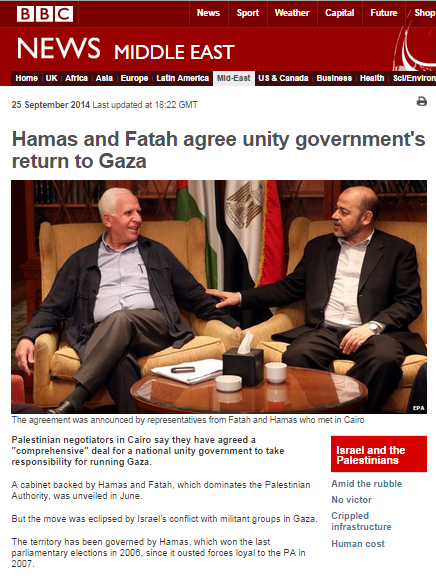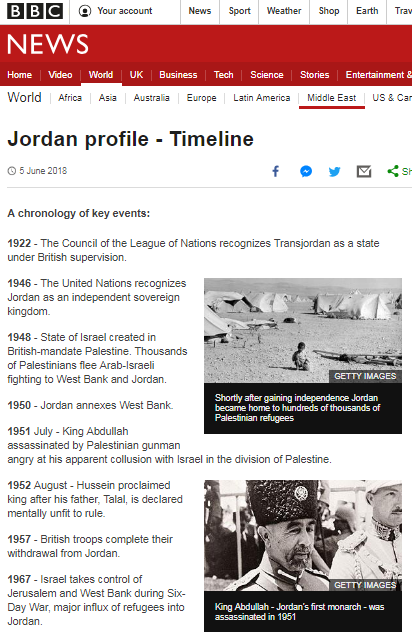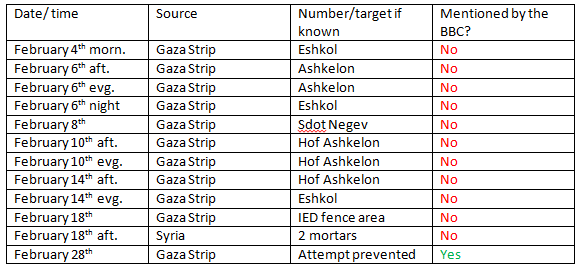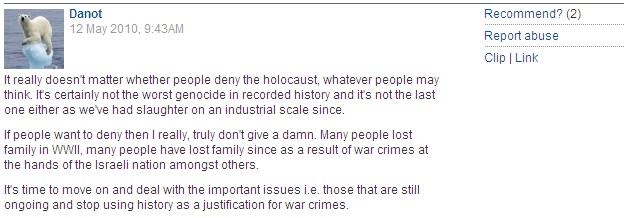September 25th saw the appearance of an article titled “Hamas and Fatah agree unity government’s return to Gaza” on the BBC News website’s Middle East page.
The report opens with the specious suggestion that the reason that the Palestinian Unity Government which came into being on June 2nd has not brought the Gaza Strip under its authority to date is the conflict between Israel and Hamas which began 36 days after that government’s inauguration (and which it did nothing to prevent) rather than internal Hamas-Fatah disagreements.
“Palestinian negotiators in Cairo say they have agreed a “comprehensive” deal for a national unity government to take responsibility for running Gaza.
A cabinet backed by Hamas and Fatah, which dominates the Palestinian Authority, was unveiled in June.
But the move was eclipsed by Israel’s conflict with militant groups in Gaza.”
The article continues:
“The territory has been governed by Hamas, which won the last parliamentary elections in 2006, since it ousted forces loyal to the PA in 2007.
The PA was left to run parts of the occupied West Bank not under Israeli control.”
Readers are not informed that the electoral mandate won by Hamas in 2006 long since expired and elections to the PLC are long overdue. Neither is it made clear that what the BBC euphemistically describes as Hamas having “ousted” the PA was in fact a violent coup. Likewise, the fact that PA control over Areas A and B is a product of agreements between Israel and the PA is not adequately clarified to readers. The article continues:
“Earlier this month, PA President and Fatah leader Mahmoud Abbas accused Hamas of operating a “shadow government” in Gaza. Hamas denied the claim, calling it “against the reality”.”
No effort is made to enable BBC audiences to place that Hamas denial in its correct context by informing them that, despite the establishment of the unity government on June 2nd, Hamas continued to run ministries such as the Ministry of Health and the Ministry of Information – both of which played active roles during the recent conflict.
Next, readers are provided with the following analysis from Kevin Connolly:
“The BBC’s Kevin Connolly in Jerusalem says bringing unity between Hamas and Fatah is a strategic aspiration for the Palestinians – but differences between the factions are bitter and profound.
The new deal is described as “comprehensive”, but not enough detail is being published to allow a real judgement on its prospects, our correspondent adds.”
In line with the BBC’s policy since the beginning of June, Connolly fails to clarify to readers that – despite the placatory assurances at the time of its inauguration – the PUG has failed to live up to the PA’s existing agreements with Israel on various issues, including the disarming of terrorist organisations in the Gaza Strip. Connolly apparently does not consider it relevant to inform audiences about crucial clauses in those existing agreements such as the ban on local weapons manufacture and import.
Later on, the report states:
“However, a Hamas official told the Associated Press that there were still disagreements over who should be responsible for paying civil servants in Gaza, and whether the PA’s own security forces would be allowed a significant presence in the territory. He described the deal as “partial”.” [emphasis added]
Despite that very clear writing on the wall, the BBC obviously does not see the necessity of making audiences aware of the fact that if Hamas and other terrorist organisations are not disarmed by the PUG and the territory not brought under the sole control of PA security forces, then the Gaza Strip – along with the rest of the PA-controlled areas – will find itself in a ‘Lebanon-style’ situation whereby the actions of a foreign-sponsored terrorist organization can continue to spark conflict whenever that suits its own (or its sponsors’) agenda.
Additionally, the obviously relevant topic of the recent exposure of a planned Hamas coup against the PA is once again ignored by the BBC in this report.
Nearly four months since the Palestinian Unity Government came into existence, the BBC has still not met its obligation to “build a global understanding of international issues” by providing audiences with anything more than superficial reporting on the topic. That failure clearly not only hampers audiences’ ability to understand current events, but also means that they will be ill-equipped to comprehend any future developments.




